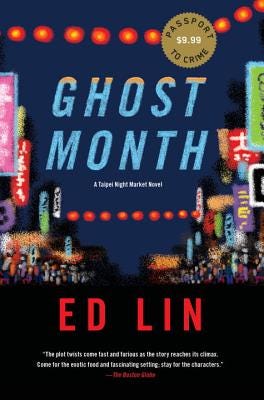'Ghost Month': A Taipei murder mystery
Ed Lin creates a protagonist haunted by his and his island's history.
bookshop plug
This spooky season, I decided to finally read “Ghost Month,” a title that’s been on my list for a while — its author, Ed Lin, and I went to journalism school together.
I also wanted to read “Ghost Month” because it’s set in Taipei, the capital of Taiwan, a city I’m fond of. But this isn’t the Taipei whose image has been carefully burnished in travel blogs and guidebooks. Lin slyly subverts that Taipei, beginning with his protagonist.
Jing-nan is a young man who’s feeling the need for some good karma as everyone around him observes Ghost Month, when hungry spirits appear among the living and must be appeased. In a society where family comes first, he’s orphaned, an only child and single. In a society that prizes academic achievement, he’s a college dropout, and not just any college dropout — he gave up a coveted slot at an American university. At the popular Shilin Night Market, which draws foreign visitors by the busload, the food stall he inherited sells dishes that only the most adventurous tourists try.
On top of all that, even while he scoffs at Ghost Month as an old-fashioned superstition, he finds himself haunted: by a family debt he didn’t know about until his father died, and by the recent murder of his childhood sweetheart, Julia, the woman he always thought he’d marry. Jing-nan and Julia haven’t been in touch in years, for a reason that’s a mystery of its own. So he’s stunned to come across a newspaper story about her death revealing that she, too, left college in the U.S. and returned to Taiwan. Even more shocking is that she was working as a “betel nut beauty,” a woman whose main job is to attract customers who chew betel nuts for their euphoric effect. Jing-nan can’t reconcile this revelation with the Julia he knew.
It’s a good premise for a murder mystery. I wish it had been written less, well, journalistically. “Ghost Month” periodically leans into telling rather than showing with discourses on Taiwanese history, politics and society. While there’s no doubt that modern Taiwan is always looking over its shoulder at its complicated past, the editor in me wanted to suggest a more subtle approach to conveying this — maybe through a character who’s an actual ghost?
When “Ghost Month” swivels back to showing, it offers a fun trip down memory lane for readers who’ve been to Taipei, and an enticing armchair tour for the rest.



I'd like to read this, thanks Amy.